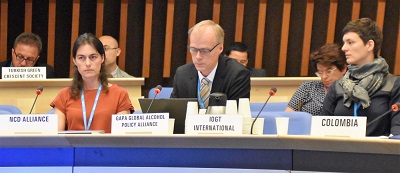WHO Forum on alcohol, drugs and addictive behaviour
26-28 June 2017 WHO held the Forum on alcohol, drugs and addictive behaviour with a primary goal to enhance public health actions in these areas by strengthening partnerships and collaboration among public health oriented organisations, networks and institutions.
During the High Level segment at the first day, GAPA Secretary, Øystein Bakke, made the following intervention:
Chair,

The Global Alcohol Policy Alliance is an international network of non-governmental organisations and people working in public health agencies who share information on alcohol issues and advocate evidence-based alcohol policies, “free from commercial interests.”
Having followed the development of the Global strategy to reduce the harmful use of alcohol and later the implementation of it over the years, we see that the resources allocated to addressing these harms are minuscule. New developments like cross border marketing, including in social media, and economic treaties only exacerbate the situation. The low and middle income countries are targeted and they are the ones who are going to provide the future profits of the multinational alcohol industry. These countries lack the resources to stem the tide. And changing this is not easy, as pointed out in an intervention in the NCD debate at the recent World Health Assembly. Ghana, on behalf of the whole African region pointed out: “The glaring and continued underfunding of work to accelerate implementation of NCD prevention and control measures in the region needs to be addressed, particularly in the area of industry interference that block measures to implement domestic taxes on health-harming products in order to ensure the self-financing of national responses.”
We are convinced that a legally binding instrument to strengthen the public health response to harmful use of alcohol is needed. We were encouraged by observing the debate at the WHA where Sri Lanka, on behalf of 11 SEARO countries; Estonia on behalf of the three Baltic states; and other countries like Botswana and Norway pointed to the problems mentioned and asked the DG to initiate and resource an Expert Committee to report on the alcohol control situation and progress. More than 10 years have passed since the Expert Committee on alcohol met last time. Let this be the first step – it is now time that bold steps are taken – and that resources are mobilised to support them.